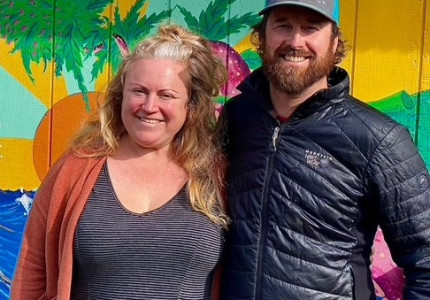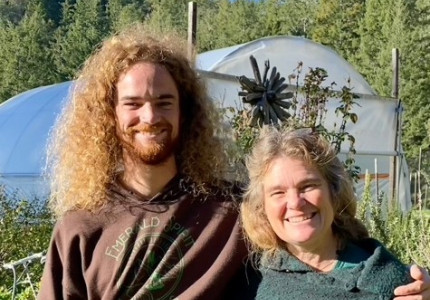Wayne Baynham and Pam Buckbee are beloved elders of the Mendocino County cannabis family- “Original Growers” who arrived during the Back to the Land Movement, settling in the hills east of Laytonville. Wayne has been growing cannabis since the 1970’s.
“I flew to California in the ‘60’s,” says Pam, 74, who describes herself as “an inherent survivor.” She is a graphic and fine artist as well as a seamstress.
“I had been accepted to the Maryland Institute of Art. I took my babysitting money, bought a bus ticket and told my parents I wasn’t returning. On the journey, I sat next to a lady who gave me Owsley acid. That was my first acid trip! I swore I was abducted by aliens. Everything was jewels and sparkling, but in truth, I was probably a little psychotic,” she laughs. In recognition of that bygone era, a number of iconic psychedelic posters created by the noted East West Totem studio hang in the Baynham’s barn- part of Pam’s pre-Laytonville history.
“My son Ben McHugh went to high school in Laytonville. We were responsible for so many kids. They used to just get on the road and hitch,” she recalls, noting she used to drop off Green Day drummer Tré Cool at school.

Following the receipt of an Applied Mathematics degree from the University of Waterloo, Wayne left his home in Canada, visiting a substantial chunk of the world. “I went to Europe in 1970 and ended up in Morocco, which was wonderful. You could get a room for a dollar and a meal for 25 cents- and don’t forget the kief and hash,” he chuckles.
Upon coming to California, Wayne moved to Guerneville and then onto Laytonville in 1974. After working with a friend in Willits, he moved to their current property in 1978 and,have been here ever since.

“I lived in a 4x8 camper,growing with a guy in Willits, and moved to Laytonville in 1978 to the property next door. I never wanted neighbors, so I ended up buying this property and another adjoining parcel.”
“When I first lived here, I didn’t leave the property for four months,” says Wayne. “We used to grow all our own food,” says Pam. “I ate potatoes, spinach, fried dough, and when they produced, wild grapes. And an occasional rattlesnake,” Wayne smiles. “We worked 365 days a year. All we did was work,” Pam continues.
We carried everything up here,” says Wayne, including a 1917 Snooker table and an impressive collection of vintage cars.
Back then, growing “pot” was a perilous endeavor.
“We have photos of helicopters hauling out confiscated weed inside a water tank,” says Wayne. “So we went indoors for several years and moved outside again after Prop 215. I never needed more than 25 plants. That’s all I grow. When the State came to inspect, they said I could expand. I said, ‘Where? I don’t want to destroy the land.’”
The award-winning farmer says, “Living here with the sun, the water and good genetics, I don’t think you can really go wrong. The older my soil, the better my plants do. You don’t feed the plants- you feed the soil. Then they do what they do. Mendocino grows good pot.”
Wayne is celebrated for his legendary strains.
“In the ‘70’s, guys traded Converse shoes for Malawi weed wrapped in banana leaves. We got seeds from all those smugglers bringing weed and hash from Afghanistan and Nepal.”
 “I create all my own. That’s what intrigues me. I believe a lot of the current strains are hype. When I first started making seeds I was growing indoors. At that time, I had White Widow and Blueberry. I got feminized seeds, which I don’t believe were crossed. It probably started with the White Widow turning into ‘Blue Widow.’
“I create all my own. That’s what intrigues me. I believe a lot of the current strains are hype. When I first started making seeds I was growing indoors. At that time, I had White Widow and Blueberry. I got feminized seeds, which I don’t believe were crossed. It probably started with the White Widow turning into ‘Blue Widow.’
Wayne’s strains have landed him a 3rd place in the 2005 Emerald and 5th place in 2018, in addition to other awards.“The Buckle Up strain started with 3 free seeds. I got the Bi-lo at the first Emerald Cup in Santa Rosa. All were males, bred to my females. The terps tested at 4.8%.”
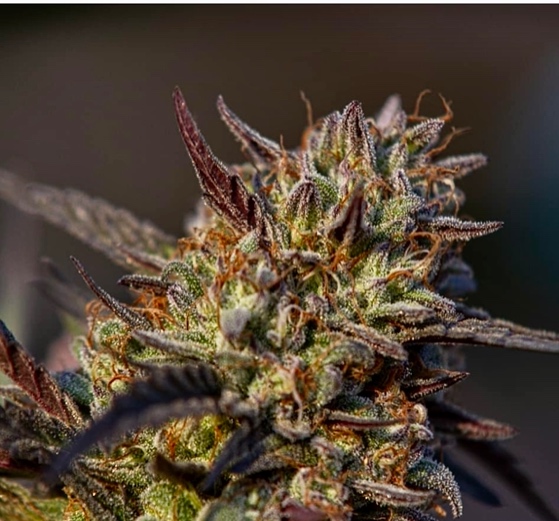 Seeds, seeds, seeds. Neville’s Original Haze. Original Skunk. Double Dream. Durban Poison. Agent Orange. Malawi. The Original Afghani. Black Lime Reserve. The Durban, Black Lime, Malawi and Agent Orange are the basis for African Sisters, Wayne’s KMI entry.
Seeds, seeds, seeds. Neville’s Original Haze. Original Skunk. Double Dream. Durban Poison. Agent Orange. Malawi. The Original Afghani. Black Lime Reserve. The Durban, Black Lime, Malawi and Agent Orange are the basis for African Sisters, Wayne’s KMI entry.
African Sisters is a combo of African Orange (Agent Orange crossed with Old School Malawi) and Durban Lime (Durban Poison crossed Black Lime Reserve).
Buck and Ham Farms lies thousands of feet above of the Eel River Drainage. Wayne has fought a contentious battle with Fish and Wildlife- a disagreement about the agency’s demand that a small pond be filled over.

“They say, ‘This drainage could create sediment and wash down Spy Rock Road.’ But everything runs into a natural drainage. Why aren’t we changing 101? Water will run in the same damn drainage, regardless of where we go.”
“We hire these consultants. They come out and say, ‘Fish and Wildlife is crazy.’ But do they write that in their report? No. Who gets left holding the bag? We do. We suffer. I’m forced into doing what Fish and Wildlife says.”
Wayne filled his pond. “It’s solved. All the consultants did was paste and copy from their handbook. That’s what you’re paying for. They’re not doing anything for me. Do my little gardens truly affect the lay of the land?”
Wayne sweeps his arms, delineating a vast expanse of tree-filled hillsides- thousands and thousands of acres. “I’m the only one- from over here to over there. How much water do I use for my cannabis? It’s negligible.”
“Each property should be looked at as its own entity,” says Wayne. He recounts several incidents of troubling encounters with inspectors, who hold his life- his cannabis licensure- in their hands.

A Fish and Wildlife inspector arrived with an observer- a recent Humboldt State graduate who Wayne called “an egg that just hatched.” The observer discovered a remnant of a plastic trash bag, containing roots that Wayne was trying to kill using heat.
“This person calls the inspector because there was ‘plastic’ near the garden! You can see this batch of eggs are good hatches,” he notes, sardonically. “Fish and Wildlife threatened me with a warden and gun if I moved a tank.”
The Baynhams used to raise top breed horses. Their large stable once housed 13 horses. Today, one remaining horse enjoys life in the steel structure and wraparound paddock. “These people came to do their inspection. Our horse had been bitten by a snake, and the leg was slow to heal. Next thing we knew, animal control arrived, investigating a claim of animal abuse. They saw no problem whatsoever. To be called abusers,” sighs Pam, shaking her head. “I offered to show Animal Control all our vet bills, but they said it wasn’t necessary,” says Wayne.
“Those people were more interested in taking pictures of a rattlesnake than inspecting our spring,” says Wayne. “I offered the girl some fresh water from the spring, but she chose to drink from her plastic thing filled with tap water.”

“Proposition 64 is regulation, not legalization. Most of us are emotionally, mentally destroyed. We know people who have died trying to comply. I’m a survivor but dealing with this at this time of life is unreal. It’s direct abuse. And once you realize it, it’s too late,” Wayne explains.
Homer Helm was a dear friend of the Baynham’s. “If Homer built a road, it was legal- never over a 15% grade. He was a logger and could do anything. I learned so much from him. Homer used to say, ‘Wayne, sometimes It’s just bigger than all of us. You and I can’t carry enough money to fix it.’”
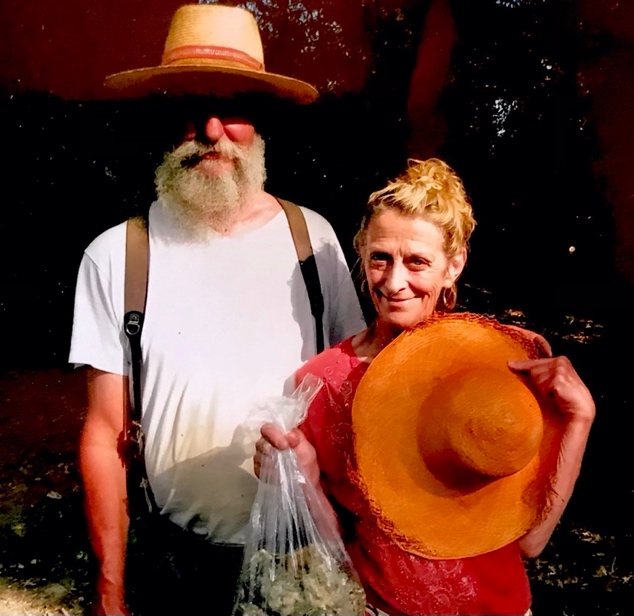 After decades living on the farm, amongst the close-knit Laytonville community, the family now has a “town house” which helps them manage medical appointments and eases some of the physical challenges of rural living. “I think I’ve been to Covelo twice in my life,” Pam smiles.
After decades living on the farm, amongst the close-knit Laytonville community, the family now has a “town house” which helps them manage medical appointments and eases some of the physical challenges of rural living. “I think I’ve been to Covelo twice in my life,” Pam smiles.
“Am I rich?” Wayne laughs. “I’m very fortunate to have gotten to live here. To drink water from the spring, to live this life for all these years. I want to live this lifestyle longer. I don’t want to move. We’re trying to comply with these rules. I want to continue being a good steward to the land.”
“Buyer beware,” says Wayne. “If you buy on the traditional market, you don’t know what you’re smoking. What I grow isn’t going to hurt anyone. It’s medicine. Pot’s been our salvation.”
Nevertheless, the last few years haven’t been easy.
“Last year, I took money out of our retirement, just to pay bills. Why am I fighting?”
“Because.” smiles Pam. “You’re the person that likes to solve unsolvable equations.”

Buck N Ham Farms entered African Sister in the Kure Mendocino Invitational.


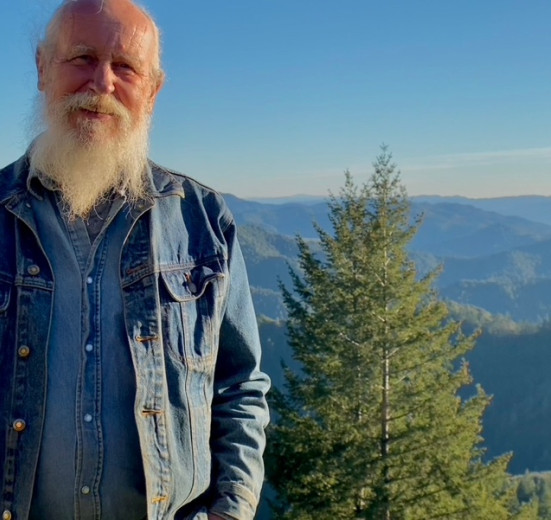

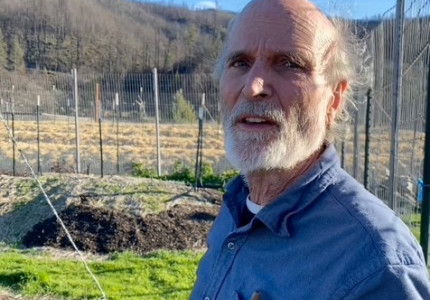
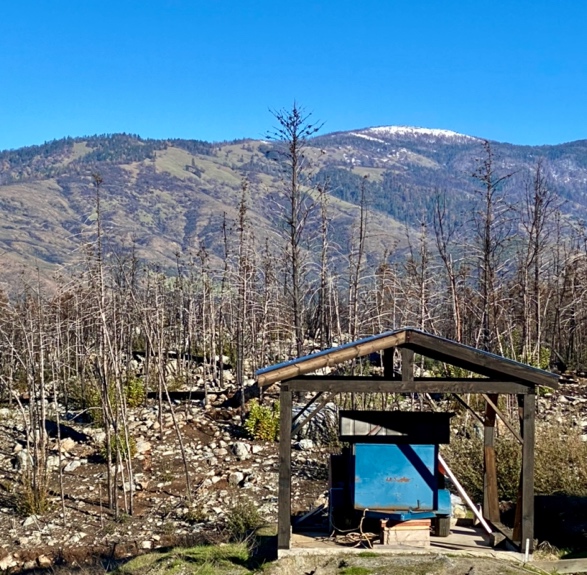 “I’ve only quit smoking three times since 1964,” he smiles.
“I’ve only quit smoking three times since 1964,” he smiles.